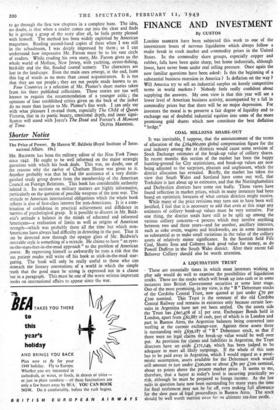FINANCE AND INVESTMENT
By CUSTOS LONDON manicErs have been subjected this week to one of the intermittent bouts of nervous liquidation which always follow a mator break in stock market and commodity prices in the United States. In the commodity share groups, especially copper and rubber, falls have been quite sharp, but home industrials, although lower, have never been under real selling pressure. Once again the now familiar questions have been asked: Is this the beginning of a substantial business recession in America ? Is deflation oil the way ? Will America try to sell an industrial surplus on keenly competitive terms in world markets ? Nobody feels really confident about supplying the answers. My own view is that this year will see a lower level of American business activity, accompanied by a fall in commodity prices but that there will be no major depression. For investors the moral is to preserve a fair degree of liquidity and to exchange out of doubtful industrial equities into some of the more promising gold shares which now constitute the best deflation "hedge."
COAL MILLIONS SHARE-OUT
It was inevitable, I suppose, that the announcement of the terms of allocation of the L164,660,000 global compensation figure for the coal industry among the 21 districts would cause some revision of Stock Exchange estimates of the break-up value of colliery shares. In recent months this section of the market has been the happy hunting-ground for City statisticians, and break-up values are now being adjusted to the surprises, pleasant and unpleasant, which the district allocation has revealed. Briefly, the market has taken the view that South Wales and Scotland have come out well, that Yorkshire is just about up to estimates, and that the Nottinghamshire and Derbyshire districts have come out badly. Those views have found reflection in market prices, which in many instances had been based on optimistic forecasts of what certain districts might receive.
While many of the price revisions may turn out to have been well justified, I feel that it is necessary to add that even at this stage any estimates of colliery break-up values must be very tentative. For one thing, the district totals have still to be split up among the various colliery concerns—a process which may involve anything between two and three years and for another, ancillary interests, such as coke oven's, wagons and brickworks, are in some instances so substantial as to make small variations in the value of the colliery assets of relatively minor significance. In the Scottish field Fife Coal, Shotts Iron and Cohness look good value for money, as do Powell Duffryn in the South Wales district. After their recent fall Bolsover Colliery should also be worth attention.
A LIQUIDATION TRUST_
- These are essentially times in which most investors wishing to play safe would do well to examine the possibilities of liquidation stocks. These are the stocks which will break up into cash or in some instances into British Government securities at some later stage. One of the most promising, in my view, is the " B " Debenture stocks of the Cordoba Central Trust, now quoted at just under L70 per Liao nominal. This Trust is the remnant of the old Cordoba Central Railway and remains in existence only because certain law- suits in Argentina have not yet been settled. On the assets side the Trust has £607,478 of if per cent. Exchequer Bonds held in London, apart from £62,887 of cash, part of which is in London and part in Buenos Aires, the Argentine balances being converted into sterling at the current exchange-rate. Against these assets there is outstanding only 039,187 of " B " Debenture stock, so that if there were no legal claims the break-up value would be well over par. As provision for claims and liabilities in Argentina, the Trust directors have set aside £171,149, which has been judged to be adequate to meet all likely outgoings. If the whole of this sum has to be paid away in Argentina, which I would regard as a pessi- mistic- assumption, assets available for the Debenture stock would still-amount to just under L500,000 or about ,C8o per Ltoo nominal, about to points above the present market price. It seems to me, therefore, that a buyer at today's level is incurring practically no , risk, although he must be prepared to forego income. As the law suits in question have now been outstanding for many years the time for final settlement may not be far off, even making full allowance for the slow pace of legal proceedings in Buenos Aires. The stock should be well worth putting away for an ultimate tax-free profit.






































 Previous page
Previous page